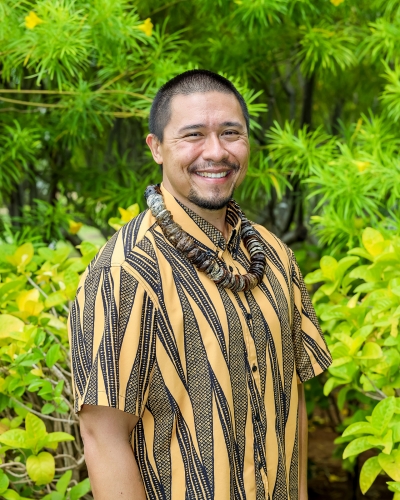
Renson Madarang
Hawaiian Cultural Manager, Ka’ūpūlehu Cultural Center
Four Seasons Tenure
- Since 2025
- First Four Seasons Position: Current
Employment History
- National Park Service, Puʻukoholā Heiau National Historic Site, Kawaihae, Hawaiʻi; Kahilu Theatre Foundation, Kamuela, Hawaiʻi; Indiana University, Bloomington, Indiana; Mana Maoli, Honolulu, Hawaiʻi; Hawaiʻi Opera Theatre, Honolulu, Hawaiʻi; RM Voice Studio, Hawaiʻi
Birthplace
- Honolulu, Hawaiʻi
Education
- Doctor of Music studies, Voice, Indiana University Jacobs School of Music
- Master of Music, Voice and Opera, University of Hawaiʻi at Manoa
- Bachelor of Arts, Music, University of Hawaiʻi at Manoa
- Associate of Arts, Leeward Community College
Languages Spoken
- English, Hawaiian
Asking Renson Madarang about his approach to sharing Hawaiian culture at Four Seasons Resort Hualālai is an easy way to learn two Hawaiian proverbs.
“Not all knowledge is found in one school” describes not only his appreciation for the diverse perspectives of his fellow cultural practitioners at the resort’s Ka’ūpūlehu Cultural Center, according to Madarang, but also his academic journey from the islands to Indiana and back. And on this coastline rich in natural and human history, Madarang also finds special resonance in the saying “The land is the chief, man is its servant,” considered a fundamental Hawaiian value.
“We have quite a few archaeological and culturally significant features on our property and it’s of the utmost importance for us to prioritize ʻāina (the land),” he notes. “If you learn to treat your surroundings like your family, your children, or your elders, hopefully those surroundings will take care of you like family. That’s the perspective that is continually introduced here and that I hope we can continue.”
Of Hawaiian, Portuguese and Filipino descent, Madarang grew up in Honolulu with family ties to both Oahu and Hawaiʻi Island. He credits his grandparents for teaching him “what truly holds value in life” and his father for fostering his love of music in particular, a passion that eventually led to doctoral studies on Hawaiian and Western understanding of voice and music. Today Madarang’s cultural practices also comprise the traditional skill of ulana ʻie ʻie, weaving with the ʻie ʻie vine; featherwork, which he learned from Kumu Hulu Nui Rick San Nicolas, who created the reproduction of King Kamehameha’s ahuʻula (feather cape) on display in the Four Seasons Resort Hualālai lobby; and oratory, a combination of moʻolelo (storytelling), oli (chant) and protocol.
Madarang is also a proud member of the Royal Order of Kamehameha, founded by King Kamehameha V in 1865. “Our kuleana (responsibility) is to more or less assure that no more harm comes to Hawaiʻi and to upkeep and maintain our ancient chiefly customs and traditions,” he explains. That’s why every June, you’ll find Madarang participating in King Kamehameha Day processions, and in August conducting formal ceremonies at Puʻukoholā Heiau, the temple King Kamehameha I ordered built before beginning his quest to unify all the Hawaiian Islands.
Sharing the stories of Hawaiʻi Island’s Aliʻi with Four Seasons guests from around the world is also part of Madarang’s kuleana. “Everything we do here is honoring their stories and what they did in their lifetime, so their story is never forgotten,” Madarang says.

